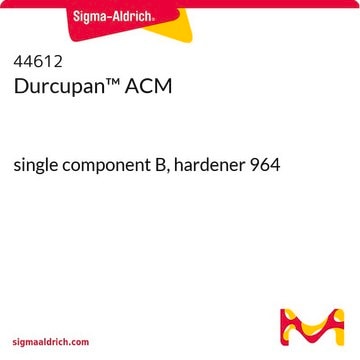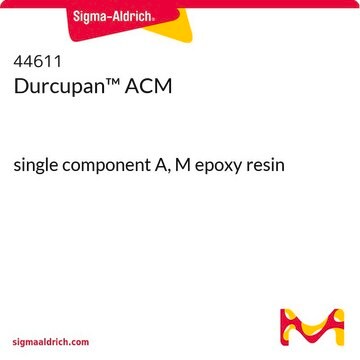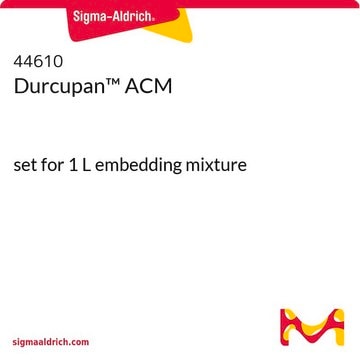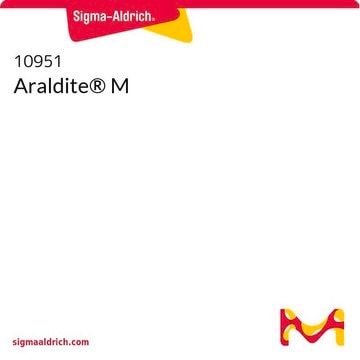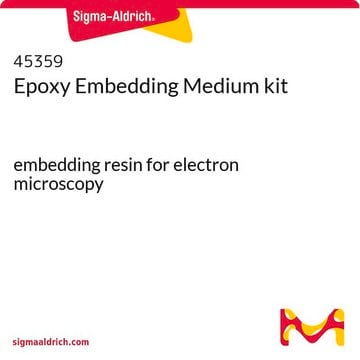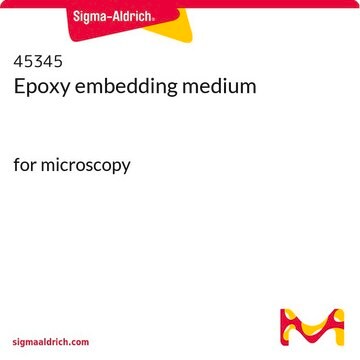44613
Durcupan™ ACM
single component C, accelerator 960 (DY 060)
Sign Into View Organizational & Contract Pricing
All Photos(1)
About This Item
Recommended Products
Application
Embedding material for electron microscopy on the basis of Araldite.®
Legal Information
Araldite is a registered trademark of Huntsman Advanced Materials Inc.
Durcupan is a trademark of Sigma-Aldrich Chemie GmbH
related product
Product No.
Description
Pricing
Signal Word
Danger
Hazard Statements
Precautionary Statements
Hazard Classifications
Acute Tox. 4 Oral - Eye Dam. 1 - Skin Corr. 1B
Storage Class Code
8A - Combustible, corrosive hazardous materials
WGK
WGK 3
Flash Point(F)
Not applicable
Flash Point(C)
Not applicable
Personal Protective Equipment
dust mask type N95 (US), Eyeshields, Gloves
Certificates of Analysis (COA)
Search for Certificates of Analysis (COA) by entering the products Lot/Batch Number. Lot and Batch Numbers can be found on a product’s label following the words ‘Lot’ or ‘Batch’.
Already Own This Product?
Find documentation for the products that you have recently purchased in the Document Library.
Tin Ki Tsang et al.
eLife, 7 (2018-05-12)
Electron microscopy (EM) offers unparalleled power to study cell substructures at the nanoscale. Cryofixation by high-pressure freezing offers optimal morphological preservation, as it captures cellular structures instantaneously in their near-native state. However, the applicability of cryofixation is limited by its
Keun-Young Kim et al.
Cell reports, 29(3), 628-644 (2019-10-17)
The form and synaptic fine structure of melanopsin-expressing retinal ganglion cells, also called intrinsically photosensitive retinal ganglion cells (ipRGCs), were determined using a new membrane-targeted version of a genetic probe for correlated light and electron microscopy (CLEM). ipRGCs project to
David E Gordon et al.
Molecular cell, 78(2), 197-209 (2020-02-23)
We have developed a platform for quantitative genetic interaction mapping using viral infectivity as a functional readout and constructed a viral host-dependency epistasis map (vE-MAP) of 356 human genes linked to HIV function, comprising >63,000 pairwise genetic perturbations. The vE-MAP
Daniela Boassa et al.
Cell chemical biology, 26(10), 1407-1416 (2019-08-06)
A protein-fragment complementation assay (PCA) for detecting and localizing intracellular protein-protein interactions (PPIs) was built by bisection of miniSOG, a fluorescent flavoprotein derived from the light, oxygen, voltage (LOV)-2 domain of Arabidopsis phototropin. When brought together by interacting proteins, the
Noemi Holderith et al.
Cell reports, 32(4), 107968-107968 (2020-07-30)
Elucidating the molecular mechanisms underlying the functional diversity of synapses requires a high-resolution, sensitive, diffusion-free, quantitative localization method that allows the determination of many proteins in functionally characterized individual synapses. Array tomography permits the quantitative analysis of single synapses but
Our team of scientists has experience in all areas of research including Life Science, Material Science, Chemical Synthesis, Chromatography, Analytical and many others.
Contact Technical Service